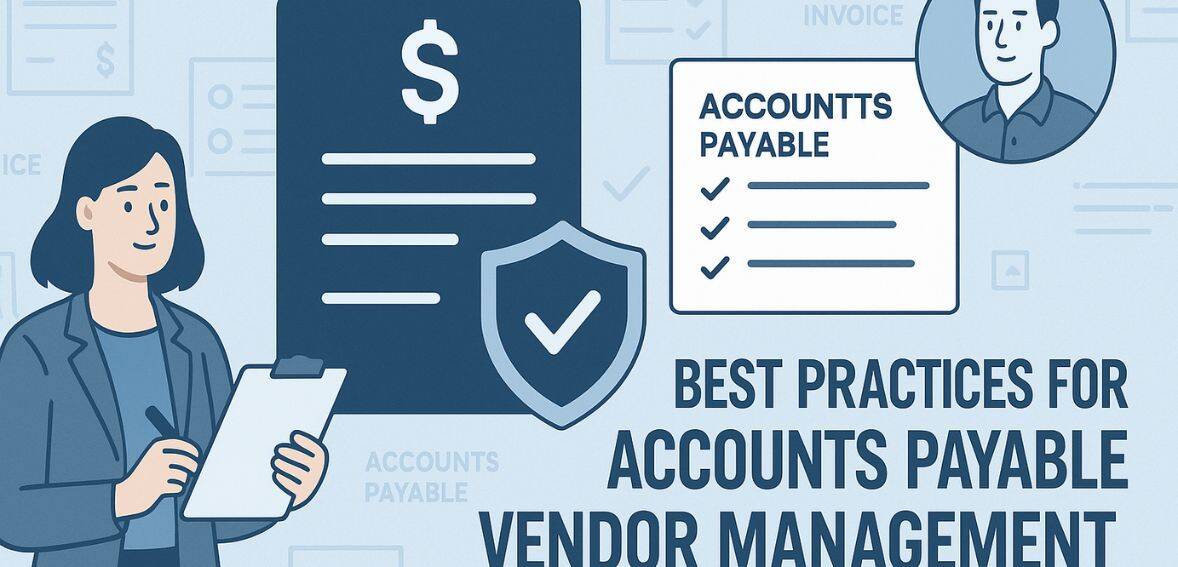
By Gladys Serrano June 6, 2025
Effective accounts payable management is one of the cornerstones of a company’s financial health. Among its many components, vendor management stands out as one of the most crucial. The way a business handles its vendors can determine not only the efficiency of operations but also the company’s reputation and long-term financial stability. Poor vendor management can lead to late payments, missed deadlines, disputes, and damaged relationships, all of which have the potential to disrupt cash flow and erode trust. On the other hand, an organized and transparent accounts payable (AP) process enhances operational efficiency, reduces costs, and builds long-lasting partnerships with vendors.
This article explores the best practices that can help companies strengthen their accounts payable vendor management processes. From vendor selection to risk assessment, automation, and compliance, these strategies are designed to ensure accuracy, transparency, and efficiency across the board.
Understanding the Importance of Accounts Payable Vendor Management
Accounts payable vendor management goes far beyond simply paying invoices on time. It involves overseeing every stage of the relationship with external suppliers and service providers, from onboarding and contract negotiation to payment processing and performance evaluation. The purpose is to maintain transparency, ensure accuracy, and create mutual trust between both parties.
A well-structured vendor management system ensures that invoices are processed promptly, payments are accurate, and communication with vendors is consistent and professional. Businesses that invest in these systems often enjoy lower operational costs, stronger partnerships, and improved supplier performance. Conversely, a weak vendor management process can result in overpayments, compliance risks, strained relationships, and even reputational harm.
When businesses recognize the strategic value of accounts payable vendor management, they begin to treat it as an integral part of their financial planning rather than just a back-office task. This perspective shift allows them to build a sustainable process that supports financial stability, operational resilience, and long-term growth.
Streamlining the Vendor Selection Process

The foundation of effective vendor management begins with selecting the right partners. Choosing the wrong vendor can lead to missed deadlines, poor-quality goods or services, and financial disputes. Therefore, the vendor selection process must be deliberate, data-driven, and aligned with the organization’s operational goals.
When evaluating vendors, businesses should consider factors such as reputation, experience, reliability, and pricing structure. The vendor’s financial stability also plays an important role, as a financially unstable supplier poses a risk to business continuity. In addition, the vendor’s ability to meet deadlines, maintain quality standards, and respond promptly to inquiries can determine the success of future collaborations.
Establishing clear criteria for vendor evaluation ensures consistency and fairness in the selection process. Companies should also negotiate transparent payment terms and conditions at the beginning of the partnership. Clear communication about pricing, penalties, and payment schedules prevents misunderstandings and sets the tone for a professional relationship. Vendors who trust that they will be paid fairly and on time are more likely to offer favorable terms, discounts, and reliable service in return.
Implementing Efficient Invoice Processing Systems
Invoice processing is one of the most time-consuming aspects of the accounts payable workflow. Every invoice represents a commitment of financial resources and requires careful review and approval before payment. Manual invoice handling often leads to delays, misplaced documents, and human errors, all of which can cost the business time and money.
Modern companies increasingly rely on automation to handle invoice processing efficiently. Automated systems can match purchase orders, receipts, and invoices, ensuring that all payments are valid and supported by proper documentation. These tools also route invoices through the appropriate approval chains automatically, reducing bottlenecks and ensuring timely payments.
Automation enhances both accuracy and transparency. With digital tracking systems, businesses can create complete audit trails for every transaction, making it easier to identify discrepancies or resolve disputes. Vendors benefit as well, since they can monitor invoice statuses in real time and receive prompt updates on payment schedules. The result is a faster, more reliable process that fosters confidence on both sides.
Efficient invoice processing not only saves time but also allows accounts payable teams to focus on higher-level financial analysis and vendor relationship management. When routine tasks are automated, staff can redirect their efforts toward strategic initiatives that add value to the organization.
Building Strong and Lasting Vendor Relationships

Vendor relationships are at the heart of successful accounts payable management. A company that values and nurtures its relationships with vendors is more likely to benefit from loyalty, preferential treatment, and flexibility during challenging times. Building strong relationships begins with mutual respect, transparent communication, and consistent reliability.
Vendors appreciate businesses that communicate clearly, make timely payments, and respond promptly to inquiries. When issues arise, vendors expect openness and collaboration to find solutions rather than blame. Informing vendors early about any potential payment delays or invoice discrepancies helps maintain trust and goodwill. Even during difficult situations, transparency reassures vendors that they are working with a dependable partner.
Recognition also plays an important role in maintaining long-term relationships. When vendors deliver exceptional service, acknowledging their efforts strengthens the partnership. Vendors who feel valued are more willing to go above and beyond to support your business goals. On the other hand, poor communication or repeated late payments can damage relationships and cause suppliers to deprioritize your company’s orders or even end the relationship altogether.
Strong relationships also provide leverage during negotiations. Vendors who have confidence in your reliability may offer better pricing, extended credit terms, or exclusive access to products and services. Over time, these advantages contribute significantly to operational efficiency and cost savings.
Centralizing Vendor Data for Improved Efficiency
Many organizations struggle with decentralized vendor data scattered across multiple departments and systems. Purchase orders might be managed by procurement, invoices by accounts payable, and contracts by legal or operations teams. This fragmentation creates inefficiencies, errors, and difficulties in accessing accurate information when needed.
Centralizing vendor data in a unified management system eliminates these challenges. A centralized vendor database allows companies to store all relevant details — such as contracts, payment terms, contact information, and transaction histories — in one secure location. This not only simplifies data retrieval but also improves consistency and accuracy across departments.
Cloud-based platforms have become particularly popular for vendor data management. They provide real-time access, secure storage, and collaboration tools that allow multiple stakeholders to work efficiently. A centralized system also helps prevent duplication, reduces administrative overhead, and minimizes the risk of data loss.
Centralization enables companies to generate comprehensive reports on vendor performance, spending patterns, and compliance metrics. This insight supports strategic decision-making and allows businesses to identify their most valuable vendor partnerships. In addition, maintaining up-to-date vendor data ensures compliance with internal controls and external regulations, reducing the risk of errors and penalties.
Regularly Reviewing Vendor Performance
Vendor management does not end once a contract is signed or a payment is made. To ensure continued value, businesses must regularly assess vendor performance. Routine evaluations allow companies to identify underperforming vendors, recognize top performers, and make informed decisions about future collaborations.
A structured review process typically considers key performance indicators such as quality, reliability, pricing, responsiveness, and compliance with contractual terms. These reviews provide valuable feedback that can be shared with vendors to encourage improvement. Constructive feedback fosters accountability and motivates vendors to maintain high standards.
Regular performance reviews also provide opportunities to renegotiate terms. For example, if a vendor consistently meets or exceeds expectations, the company may seek volume discounts or extended credit terms. Conversely, if a vendor fails to meet requirements, management may decide to adjust the agreement or explore alternative suppliers.
Beyond immediate performance, vendor reviews help maintain market competitiveness. They allow businesses to benchmark existing suppliers against industry standards and emerging competitors. This proactive approach ensures that the organization always has access to the best possible partners for its needs.
Managing Risk in Vendor Relationships
Vendor risk management is a critical aspect of accounts payable operations. Every vendor partnership carries potential risks, ranging from financial instability and operational disruptions to compliance violations. Identifying and mitigating these risks protects the company’s financial integrity and business continuity.
An effective risk management strategy begins with due diligence during the vendor onboarding phase. Businesses should assess the vendor’s financial health, reputation, and compliance record. Periodic reviews and monitoring ensure that any changes in the vendor’s circumstances are detected early. This might include monitoring credit ratings, reviewing public filings, or tracking industry developments that could impact the vendor’s operations.
Diversification is another key risk management tactic. Relying heavily on a single vendor can expose a company to significant disruptions if that vendor experiences issues. Maintaining a diverse supplier base reduces dependency and enhances flexibility.
Risk management also involves scenario planning and contingency strategies. Companies should establish backup vendors or alternative supply channels to mitigate potential disruptions. A proactive approach not only minimizes risks but also demonstrates professionalism and preparedness in vendor relationships.
Ensuring Compliance with Legal and Regulatory Requirements
Compliance plays a vital role in accounts payable and vendor management. Failure to adhere to tax regulations, payment reporting standards, or contractual obligations can lead to costly penalties and reputational damage. Therefore, it is essential for businesses to build compliance into every stage of the AP process.
Compliance begins with understanding and applying relevant laws and regulations, including tax codes, labor laws, and data privacy standards. Vendor contracts should be reviewed carefully to ensure that all terms comply with legal requirements. Companies should also verify that vendors adhere to applicable industry regulations, such as environmental or ethical sourcing standards.
Maintaining accurate and complete records is central to compliance. Automated systems can help ensure that all transactions are documented, approved, and easily auditable. Digital audit trails simplify both internal and external reviews, reducing the risk of errors and omissions.
In addition, data security regulations require businesses to protect vendor and financial information from unauthorized access. Using secure payment gateways and encrypted communication channels helps maintain confidentiality and integrity throughout the payment process. Compliance is not just about avoiding penalties — it is about establishing a culture of accountability and trust.
Leveraging Automation for Accuracy and Efficiency
Automation has become a game changer in accounts payable management. With the growing complexity of vendor networks and the volume of invoices businesses handle daily, manual processes are no longer sustainable. Automated solutions streamline the AP workflow, reduce human error, and increase overall productivity.
Automated systems handle repetitive tasks such as invoice matching, data entry, and approval routing. These technologies allow payments to be processed faster and with greater accuracy. Automation also facilitates seamless integration between accounts payable, procurement, and finance departments, ensuring data consistency across systems.
In addition to improving accuracy, automation enhances visibility. Real-time dashboards and reporting tools allow managers to track key metrics such as outstanding payments, vendor balances, and cash flow forecasts. This insight supports more informed financial planning and strategic decision-making.
The adoption of automation also boosts vendor satisfaction. When vendors experience quick invoice approvals and timely payments, they gain confidence in the company’s reliability. Automation thus benefits both sides of the relationship, making the entire financial ecosystem more efficient and transparent.
Fostering Collaboration Between Departments
Vendor management is a cross-functional responsibility that requires collaboration between several departments, including procurement, finance, legal, and operations. A lack of coordination between these teams can lead to miscommunication, delays, and inconsistencies in vendor handling.
Encouraging collaboration ensures that all stakeholders are aligned on policies, procedures, and goals. For instance, procurement teams should work closely with accounts payable to ensure that purchase orders match invoices and that contractual terms are honored. Legal teams should be involved in contract reviews, while finance teams should oversee compliance and budget alignment.
Regular interdepartmental meetings and shared digital platforms help streamline communication. When all departments have access to the same data and systems, it eliminates redundancies and promotes transparency. A collaborative environment enhances efficiency, reduces conflict, and ensures that vendor management decisions are well-informed and coordinated.
Embracing Continuous Improvement
The world of vendor management is constantly evolving, influenced by technological advancements, market trends, and regulatory changes. Companies that adopt a mindset of continuous improvement can stay ahead of the curve and maintain operational excellence.
Continuous improvement involves regularly reviewing existing processes, gathering feedback from vendors and employees, and identifying opportunities for optimization. Companies should track key performance indicators such as invoice turnaround time, payment accuracy, and vendor satisfaction to measure progress and set new benchmarks.
Investing in staff training is another essential part of continuous improvement. As new tools and systems are introduced, employees must be equipped with the skills to use them effectively. A knowledgeable and adaptable team contributes directly to smoother operations and stronger vendor relationships.
By fostering a culture of innovation and improvement, organizations ensure that their accounts payable vendor management processes remain resilient and competitive.
Conclusion
Effective accounts payable vendor management is the backbone of a company’s financial stability and operational success. From selecting reliable vendors and implementing automation to maintaining compliance and managing risk, every step in the process contributes to stronger relationships and more efficient financial operations.
Businesses that invest in best practices for vendor management position themselves for sustainable growth. They reduce costs, prevent errors, and build trust with their partners. More importantly, they create an environment of transparency and professionalism that enhances both reputation and performance.
In an increasingly digital world, where efficiency and accuracy define success, mastering accounts payable vendor management is no longer optional — it is essential. By adopting these strategies, companies can streamline their processes, strengthen their vendor partnerships, and build a foundation for long-term financial excellence.
